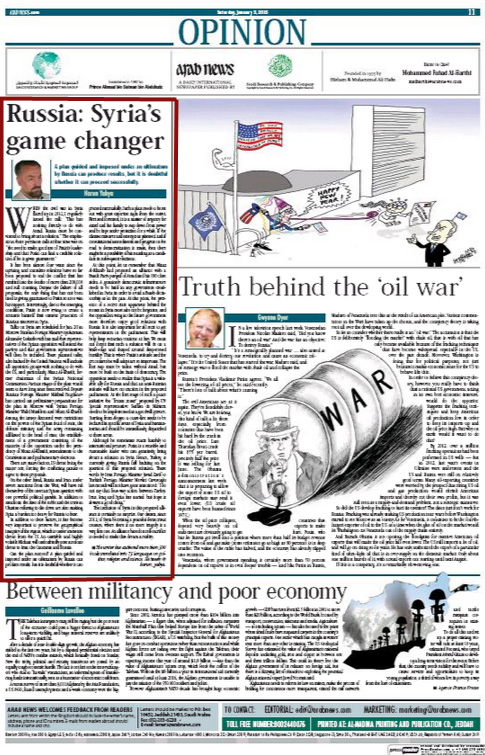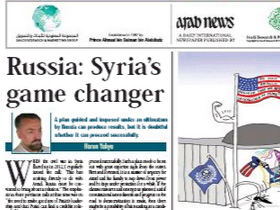
When the civil war in Syria flared up in 2012, I regularly issued the call; “This has nothing directly to do with Assad. Russia must be convinced to bring about a solution.” The emphasis in those persistent calls at that time was on “the need to make good use of Putin’s leadership and that Putin can find a credible solution if he is given guarantees.”
It has been almost four years since the uprising and countless solutions have so far been proposed to end the conflict that has resulted into the deaths of more than 200,000 and still counting. Despite the failure of all proposals, the only thing that has not been tried is giving guarantees to Putin so as to win his support. Interestingly, due to the emerging conditions, Putin is now trying to create a scenario himself that ensures protection of Russian interests in Syria.
Talks on Syria are scheduled for Jan. 20 in Moscow. Russian Foreign Ministry spokesman Alexander Lukashevich has said that representatives of the Syrian opposition will attend the parleys and that government representatives will then be included. These planned talks, also backed by the United Nations, will include all opposition groups with nothing to do with the IS, and particularly Muaz Al-Khatib, former chairman of the Syrian National Commission.
Various stages of the plan would seem to have long since been resolved. Deputy Russian Foreign Minister Mikhail Bogdanov has carried out preliminary preparations for the plan in Moscow with Syrian Foreign Minister Walid Muallem and Muaz Al-Khatib: Among the issues discussed were restrictions on the powers of the Syrian head of state, the defense ministry and the army remaining affiliated to the head of state, the establishment of a government consisting of the majority of the opposition under the presidency of Muaz Al-Khatib, amendments to the Constitution and parliamentary elections.
There are many factors, IS threat being the major one, forcing the conflicting parties to agree to these proposals.
On the other hand, Russia and Iran, under severe sanctions from the West, will have rid themselves of the onerous Syrian question with one powerful political gambit. In addition to sanctions, the state of the ruble and the crisis in Ukraine refusing to die down are also making Syria a burden too heavy for Russia to bear.
In addition to these factors, it has become very important to preserve the geographical integrity of the region, which is under immense threat from the IS. An unstable and highly volatile Mideast will undoubtedly pose a serious threat to Iran, the Caucasus and Russia.
Can the plan succeed? A plan guided and imposed under an ultimatum by Russia can produce results, but it is doubtful whether it can proceed successfully. Such a plan needs to be set out with great expertise right from the outset. First and foremost, it is a matter of urgency for Assad and his family to step down from power and be kept under protection for a while. If the climate matures and emerges as planned, and if constitutional amendments and progress on the road to democratization is made, then there might be a possibility of his standing as a candidate in subsequent elections.
At this point, let us remember that Muaz Al-Khatib had proposed an alliance with a Baath Party purged of Assad and his 300 close aides. Although the Baath Party has a dark past and terrifying ideology, there currently seems to be no alternative to its inclusion in a pluralist democracy. A genuinely democratic infrastructure needs to be built in any government established in Syria in order to avoid a Baath dictatorship as in the past. At this point, the presence of a secret state apparatus behind the scenes in Syria must also not be forgotten, and the opposition wing in the future government must therefore enjoy good relations with Russia.
It is also important for all sects, such as Sunnis, Shiites and Nusayris to get representation in the parliament. This will help keep sectarian tensions at bay.
We must not forget that such a solution will be on a knife-edge and shaped around deep-rooted hostility. This is where Putin’s attitude and the procedures he will adopt are so important. The first step must be taken without Assad, but must be built on the basis of democracy. The opposition needs to realize that Syria is a valuable ally for Russia and that an anti-Russian attitude will have no traction in the proposed parliament. Indeed, an anti-Russian policy would be unnecessary and meaningless for Syria.
At the first stage of such a peace initiative the “frozen zones” proposed by UN Special representative Steffan de Mistura needs to be implemented as a goodwill gesture. Starting from Aleppo, a cease-fire needs to be declared in specific areas of Syria and humanitarian aid should be immediately dispatched to those areas. It is essential because, people are dying, not just because of the fighting, but also because of hunger in places such as Yarmouk and Aleppo.
Although he sometimes reacts harshly to international pressure, Putin is a sensible and reasonable leader who can genuinely bring about a solution in Syria. Hence, Turkey is currently giving Russia full backing on the question of this proposed solution. These words by Iran Foreign Minister Javad Zarif to Turkish Foreign Minister Mevlut Cavusoglu last month will not have gone unnoticed:
“I do not say that four-way action between Turkey, Iran, Iraq and Syria has started, but hope is always a good thing.”
The inclusion of Syria in this proposed alliance is certainly no surprise. Our dream, since 2011, of Syria becoming a peaceful democratic country, where there is no more tragedy is a very fine one. An alliance based on self-sacrifice is needed to make that dream a reality. That will be difficult after all that has happened, of course; but we need to start building a feeling of trust among ourselves and then among our troubled neighbors.
Adnan Oktar's piece on Arab News:


